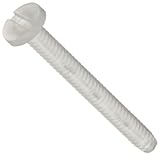by Small Parts
Buy new: $4.01
(Visit the Best Sellers in Machine Screws list for authoritative information on this product's current rank.)
Machine Screws, also referred to as Machine Bolts, are often used with nuts or driven into tapped holes. They come in a variety of head types and drive styles, but are generally available in smaller sizes.
Polypropylene is a thermoplastic which is autoclavable (meaning that it can be sterilized using steam), and is non-hydroscopic (it won't absorb water even after extended periods of contact). Polypropylene has excellent chemical resistance to dilute acids, concentrated acids (except oxidizing acids), alkalis, alcohols, detergents, and water. Polypropylene resists aromatic hydrocarbons, chlorinated hydrocarbons, greases, and oils at room temperature. Maximum operating temperature is 212 degrees Fahrenheit. Polypropylene has a low co-efficient of friction and a high dielectric strength (meaning it operates well as an insulator). Polypropylene has approximately half the tensile strength and impact strength of Nylon 6/6. The tensile strength of Polypropylene is 5000 psi (pounds per square inch). Impact Strength, as measured by the Izod impact test method (which measures force required to break material) is 0.5 pounds per foot.
Generally used in electrical or radio work, these fasteners are slightly undercut under the head. That provides the ability to bind stranded wire tightly and prevent fraying. Common applications for slotted screws include woodworking, although the drive style is not designed to be used with power drivers.
A threaded fastener's size name includes information about the major external diameter, followed by the threads per inch, which indicates if it is coarse or fine. Coarse threads are better when working with brittle materials; they are sturdier and are easier to thread and unthread compared to fine. Coarse threading also allows for thicker coatings and platings.


No comments:
Post a Comment